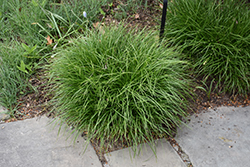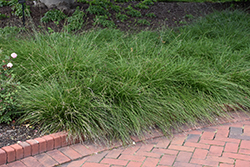>> Home
Height: 24 inches
Spread: 24 inches
Sunlight:
![]()
![]()
![]()
Hardiness Zone: 5a
Other Names: Berkeley Sedge, Formerly Carex tumulicola
Description:
A vigorous, mounding and arching evergreen plant with striking deep green foliage; makes quite a statement in containers, as an accent in the border, or as a mass groundcover; tolerates boggy, wet soils, but is also drought tolerant once established
Ornamental Features
European Grey Sedge is primarily valued in the garden for its cascading habit of growth. Its attractive grassy leaves remain dark green in colour throughout the year.
Landscape Attributes
European Grey Sedge is an herbaceous evergreen perennial grass with a shapely form and gracefully arching stems. It brings an extremely fine and delicate texture to the garden composition and should be used to full effect.
This is a relatively low maintenance plant, and is best cleaned up in early spring before it resumes active growth for the season. It has no significant negative characteristics.
European Grey Sedge is recommended for the following landscape applications;
- Mass Planting
- Border Edging
- General Garden Use
- Groundcover
- Naturalizing And Woodland Gardens
- Container Planting
Planting & Growing
European Grey Sedge will grow to be about 24 inches tall at maturity, with a spread of 24 inches. Its foliage tends to remain dense right to the ground, not requiring facer plants in front. It grows at a medium rate, and under ideal conditions can be expected to live for approximately 10 years. As an evegreen perennial, this plant will typically keep its form and foliage year-round.
This plant performs well in both full sun and full shade. It prefers to grow in average to moist conditions, and shouldn't be allowed to dry out. It is not particular as to soil type or pH. It is somewhat tolerant of urban pollution. Consider applying a thick mulch around the root zone in both summer and winter to conserve soil moisture and protect it in exposed locations or colder microclimates. This species is not originally from North America. It can be propagated by division.
European Grey Sedge is a fine choice for the garden, but it is also a good selection for planting in outdoor pots and containers. It can be used either as 'filler' or as a 'thriller' in the 'spiller-thriller-filler' container combination, depending on the height and form of the other plants used in the container planting. It is even sizeable enough that it can be grown alone in a suitable container. Note that when growing plants in outdoor containers and baskets, they may require more frequent waterings than they would in the yard or garden. Be aware that in our climate, most plants cannot be expected to survive the winter if left in containers outdoors, and this plant is no exception. Contact our experts for more information on how to protect it over the winter months.

